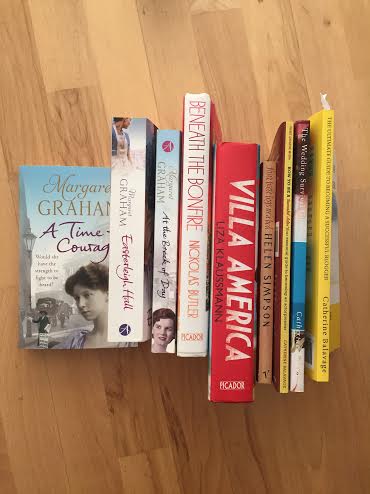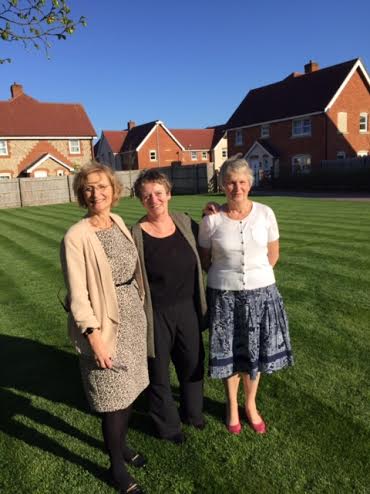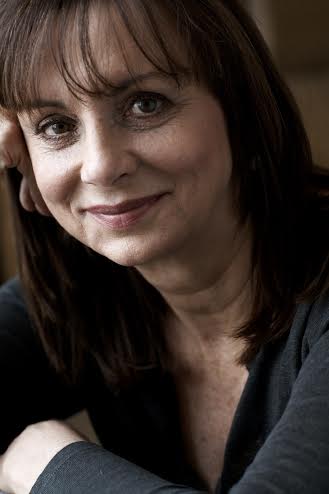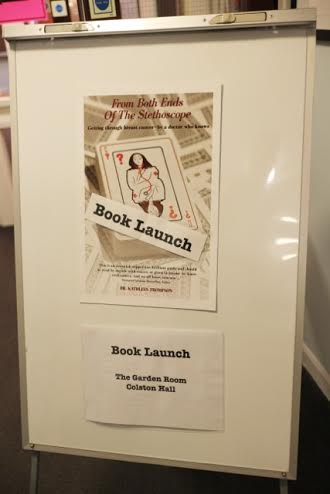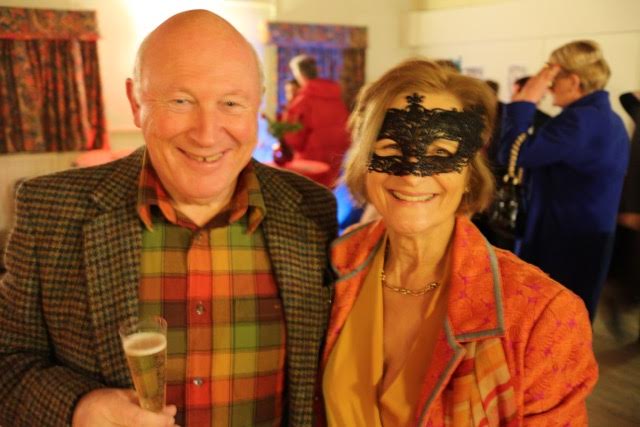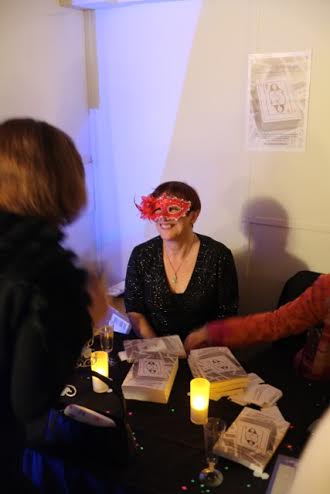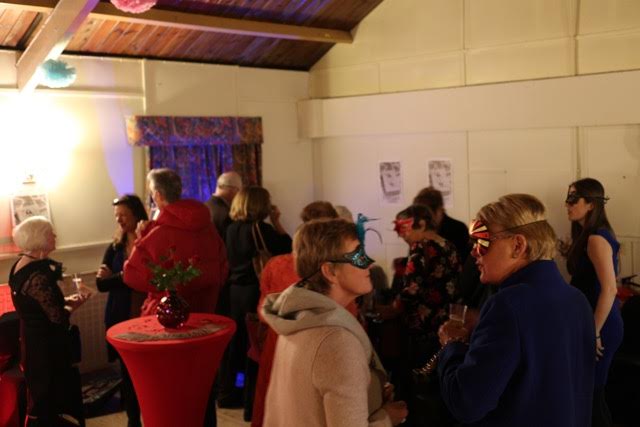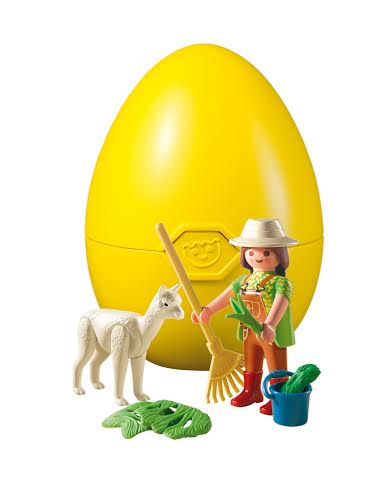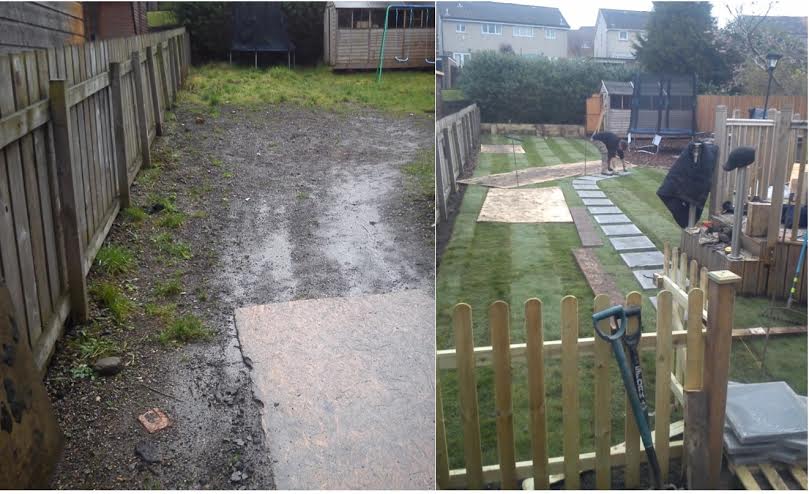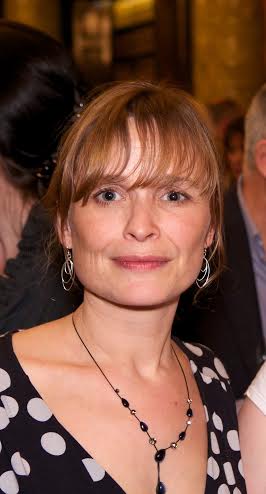Frost asked Dr Kathleen Thompson if she felt like sharing some excerpts from her enormously helpful book, From Both Ends of the Stethoscope.
Here is the first in a series of excerpts, and an invaluable read for everyone. Who knows, after all, when we will need to support someone with cancer, or even face a diagnosis ourselves. I can remember standing outside Ascot races one day last year with Kathleen, rattling collecting tins for three cancer charities. Many people stopped, and gave, because they had relatives with the disease or indeed, were, or had been sufferers themselves.
Since her brush with the disease Kathleen has lived life to the full, and perhaps with even greater gusto before. She has climbed Kilimanjaro, cycled for charity in southern India, and taken up ballroom dancing with a vengeance, (she has recently qualified for Blackpool – be still my beating heart. I intend to try and go to cheer her on). All this as well as continuing in her profession in medical research, writing a regular medical column for Frost, and best of all, writing about her own journey with cancer – From Both Ends of the Stethoscope which is full of sensible advice. The woman is a powerhouse, an inspiration, and the most amazing fun.
However did this happen to me? by Dr Kathleen Thompson
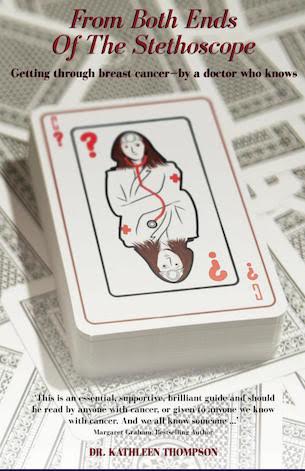
The nurse asked me to lie on the couch by the ultrasound machine.
‘The doctor will be here soon.’
A tall man with white hair walked through the door and smiled. He sat down next to the machine.
Looking straight into my eyes, he spoke. ‘The problem is, we’ve seen a lump on your mammogram. So I need to look at it with this ultrasound.’
Very gently, he pulled down my blue gown and exposed my breasts. I flinched as he squirted a blob of cold gel onto my skin. He pressed the ultrasound probe onto the blob, and moved it slowly over my right breast for a few minutes. He pointed to the fuzzy image on the small screen.
‘This is the lump — it’s about 2cm wide.’ His voice was quiet but firm. ‘Do you see the irregular shape, and these little bright flecks? These are worrying.’
He looked at me as he said this. His blue eyes offered sympathy and strength.
The screen looked like an ancient TV with a lousy reception. I couldn’t make out any lump—but I understood ‘irregular shape’ and ‘worrying’ well enough.
‘I see you’re a doctor. Where do you practice?’ he continued.
‘I was a paediatrician, but now I work in drug research.’
‘Oh? Interesting.’ His smile morphed into a serious expression, ‘I need to take a biopsy of this lump. We have these neat little things now.’ He held a small black box between his finger and thumb.
‘I’m going to press this box over the lump, then push this button, and a needle will shoot out and take the sample. It’ll make a loud click, but it won’t hurt, because I’m going to numb you first.’
I lay on the couch in the semi-darkness, watching him fill a small syringe with local anaesthetic. The cold wall, pressing against my left arm, forced me to concentrate. Everything was unreal — surreal. What was I doing here? I’d only come in for a check. My left hand gripped the coarse material of the hospital gown as if it was a survival rope. My right hand was visible to him and the nurse, so I forced it to relax.
Lifting the small syringe towards me, he injected the anaesthetic into my breast. It stung, but I hid the pain with a smile. ‘No, it doesn’t hurt. It’s fine. It’s a lovely day outside. I don’t expect you’ll have much chance to enjoy it, stuck in here.’
Somehow I controlled my voice — but tears were streaming down my face. I hoped the darkened room would hide them.
Then, a loud click shattered the quiet. He’d taken the biopsy, and he was right, it hadn’t hurt.
‘Well done. All finished. Nurse will pop a dressing on for you. Then she’ll take you to see the breast surgeon. Good luck with your research work.’ And he was gone.
On an otherwise unremarkable spring day, my life had just changed forever.
Excerpt from:
From Both Ends of the Stethoscope by Dr Kathleen Thompson
Paperback ISBN: 978-0-9935083-0-1
E book ISBN: 978-0-9935083-1-8
http://www.amazon.co.uk/dp/B01A7DM42Q

